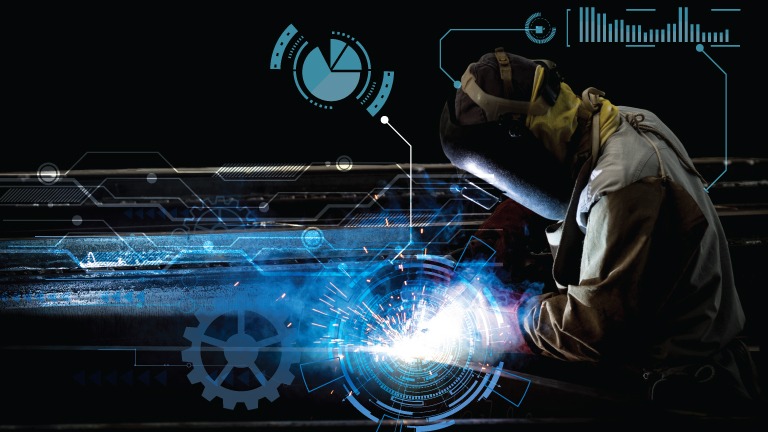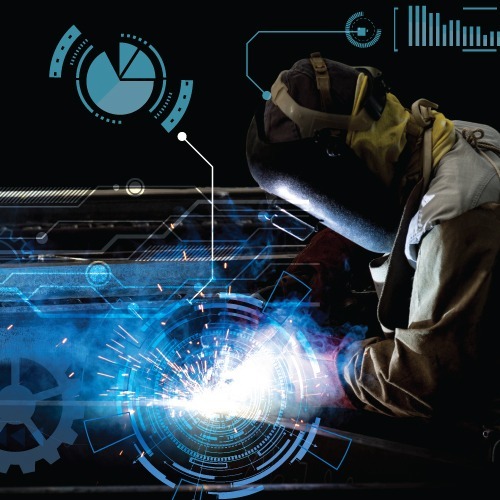
The South African manufacturing industry is currently being revolutionised by many exciting technologies.
However, as new technologies emerge, so do concerns about what the impact of technology will be on the sector, including a massive loss of manufacturing jobs and South Africa’s lack of digital skills needed to compete globally.
Frans Cronje, co-founder and managing director of machine learning company, DataProphet, is one of the local innovators and techpreneurs who are grappling with these issues.
His company develops and implements product development solutions for a wide range of industries, with a specific focus on the manufacturing sector. The company assists data-heavy businesses to discover the insights and predictive capabilities hidden in their data.
The Cape-based startup has established itself as an inspirational work environment for AI and machine learning talent in South Africa and has become a magnet for these key resources. According to Andrea Böhmert, an investment partner at Knife Capital, which recently invested in DataProphet, the startup is an example of “the kind of cutting-edge technologies South African entrepreneurs are capable of developing with global relevance in a fast-growing market”.
South Africa unfortunately is in the midst of a skills shortage which has the potential of undermining industry-wide efforts to revitalise the manufacturing sector
To find out what the real impact of technology will be on the manufacturing sector, we turn to Cronje.
A more efficient production line
For a human, or even a team of humans, it is impossible to continuously monitor every machine on the production line manually and know how each one affects the next. Similarly to how a computer is necessary to keep a fighter plane aloft and allow the pilot to fly it, Artificial Intelligence (AI) is required to help the plant managers in a manufacturing environment by vigilantly watching all the data coming off the manufacturing line and suggesting changes where they need to be made. Modern manufacturing is simply too complex for any other system.
AI can improve the quality of production. Even the most tightly controlled process cannot control the weather or prevent the wear and tear of machines. Manufacturing is often part science/part art in practice due to natural factors such as the weather or wear on the machine affecting the quality of the product control.
In our own experience of implementing AI solutions at some of the bigger foundries in the world, for example, we’ve seen how AI can be applied to prevent the shipping of defective parts (which saves manufacturers significant time and money); reduce external scrap to zero; and accurately and consistently detect faults and defects. AI in essence holds the promise of a zero-defect manufacturing environment which can drastically improve profitability and competitiveness in a manufacturing environment.
Many industries will inevitably suffer job losses as technology automates repetitive tasks. However, in a manufacturing context it is more a case of augmenting the capabilities of on-site staff
Data is the new king
With AI implemented in the manufacturing process, an engineer who uncovers any insights from process data can add this data as input to the AI’s processes.
The AI then retains the learnings. What makes this exciting is that AI doesn’t rely on a person’s memory or experience. Instead, it becomes an accurate repository of all process data and insights, including the learnings of the most experienced humans using the system, which can be used to augment new staff members’ skills and knowledge.
More importantly, AI then stores the most true, accurate and effective version of a process, solution or answer based on the collective knowledge of the people interfacing with the AI as well as its process data.
It becomes a perpetual gatherer of historic learnings that any staff member can access without loss of context or meaning. This is invaluable in a market facing the prospect of a large young workforce entering the workplace, and where workers no longer stay at one company for the duration of their careers.
Jobs will be lost, but…
Despite the concern of many that machines will take their jobs, what is more likely to happen is that the automation of mundane repetitive tasks through artificial intelligence will free up human ingenuity for more meaningful, high-value creative and strategic pursuits.
Many industries will inevitably suffer job losses as technology automates repetitive tasks. However, in a manufacturing context, it is more a case of augmenting the capabilities of on-site staff. Manufacturers generate huge volumes of data from complex systems that is very difficult for humans to interpret. An AI in this case would be fulfilling a role that currently goes unfulfilled – people simply cannot interpret all that data in a meaningful manner.
Greater demand for better-skilled workers
Successful implementation of AI in the manufacturing environment requires that the human element interfacing with the technology is sufficiently skilled to understand the insights gained from the data, make the necessary adjustments, and track improvements and changes in production to optimise yield.
South Africa unfortunately is amid a skills shortage which has the potential of undermining industry-wide efforts to revitalise the manufacturing sector. Globally, however, manufacturing leaders are powering ahead with a lean but highly skilled workforce.
Advantages, we will see the rise of customisation
As automation increases and the cost saving achieved by mass production decreases below the value of customization – consumers will be given much more choice in the products they buy. For example, when you buy a BMW, it will be made to order, and not part of a batch, which allows you to select the colour and specific features based on your individual preferences.
Reduced costs
With fewer errors made, and on-demand manufacturing becoming gradually achieved, it will result in lower stock needing to be held leading to the cost of production decreasing sufficiently to translate into a lower cost to the consumer or end-user.
And safer workplaces
As robots are introduced to the line, the team running the plant can expect to perform fewer hazardous tasks, which will have a positive effect on workplace safety in an environment that can be quite hazardous to human workers.






